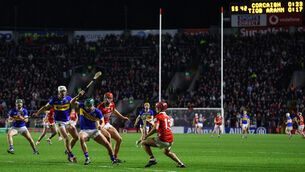Mour insecure: How Mourinho differs from Fergie

Last weekend, Guardian writer Daniel Taylor, in a column about Leicester City’s rise, detailed a chance encounter with Alex Ferguson and a coterie of associates in Wolfsburg.
Nothing remarkable occurred, just — as Taylor saw it — some everyday, casual rudeness to fans longing for a moment, a blessing, a touch of the ambassadorial blazer.
Taylor knows Ferguson and his ways well from the Manchester beat. His book, , doesn’t, as the title suggests, leave the belligerence and paranoia and hubris on the cutting room floor in its account of the genius.
And yet, it made no difference at all, to the winning, any of this belligerence and paranoia and hubris.
Indeed, while belligerence and paranoia and hubris are not listed among the key skills in any of Fergie’s library of books on the art of winning management, many would argue they each played their part in the winning, when the time was right.
So we should be wary of some of the easy answers being produced this week about the demise of Jose Mourinho.
On the face of it, this has been one of the most compelling football parables ever told.
A man who returned to his football home in a blaze of affection, and duly led them back to further glory, being dispatched just a few months later, his team in open rebellion, the winning a distant memory.
Many have had to turn to unparliamentary language to get to grips with the heat off this bonfire of vanities.
It wouldn’t be Eamon Dunphy’s first trip down that road, but this time it didn’t sound like an inexactitude when he cut to the chase: “If you’re an arsehole and people don’t like you, they won’t work for you.”
In the Guardian, Marina Hyde — newspapers’ answer to the Man from Del Monte when it comes to judiciously choosing words — asked if Mourinho was simply an ‘irredeemable prick’.
Fergie’s buddies at Harvard might call it ‘alienating stakeholders’.
And yet, we know, instinctively, being a bollox is no obstacle whatsoever at the top, top, top levels of management, in any walk of life.
And we know the belligerence and paranoia and hubris never caught up with Fergie, never led to palpable discord in the dressing room.
Or at least the kind of palpable discord that ended up with Fergie driven from the building in shame rather than the discordant player.
So we must ask what it is that separates these giants of the managerial game, which of Fergie’s dynastical powers is it that Mourinho doesn’t have, requiring him to reboot, roughly every two years, at a place where people don’t know him too well?
The most obvious answer is Mourinho’s bizarre insecurity. In essence, Fergie only required Manchester United to win. That was generally enough for him. Mourinho needs credit for the wins.
While Fergie’s paranoia was largely reserved for those obstructing United’s efforts to win; referees, media, officialdom, ballboys etc, Mourinho’s easily took in all those conspirators with plenty left over for the men in his own dressing room, men who might have their eyes on a little credit too.
If Diego Torres’s compelling account of Mourinho’s time at Real Madrid once had to be read as a novel, so many agendas were bound up in the telling; it now works as a faithful preview of the Chelsea meltdown, with accusations of leaks and rats and conspiracies and eventually a set of players unsure if their manager actually wanted them to win, if he wasn’t getting enough credit for the wins.
The toxicity might be best summed up by Mourinho’s apparent glee when Barcelona take the lead in one Clasico. Substitutes recount the remark: “You’re the clever ones. Didn’t you want to play on the attack? Well, there you have it.”
With the writing on the wall at the King Power Stadium this week, Mourinho spelt it out, publicly, maybe for the first time, what he sees, in a winning football dressing room, and what he needs the world to see.
“Sometimes I find myself thinking last season I did such an amazing job I brought players to a level that is not their level.”
It is an outlook on football and life that probably shapes the other notable difference between Mourinho and Ferguson; their attitudes to their greatest players.
Among the more striking passages of Ferguson’s recent autobiography were those recounting his great love affair with Cristiano Ronaldo. Ferguson likens the moment he first saw Ronaldo play, in Lisbon, to striking gold in Klondike.
“The biggest surge of excitement, of anticipation, I experienced in football management.”
It is an ardour that never cools, even when they are cruelly prized apart by ambition and commerce: “Our bond survived our parting: a happy outcome in a game of transitory relationships.”
Even then, Fergie was two-timing his other great amour, Eric Cantona, a love laid bare in that remarkable letter recently released by Man United, sent by Ferguson after Cantona’s departure.
“If you just pop in unexpectedly for a cup of tea, no fanfare, just for a chat as friends, that would mean more to me than anything,” Fergie writes.There is invariably enough humility in most of the great managers to recognise the debt they owe their greatest players.
You think of Brian Clough branding John Robertson his Picasso. Guardiola calling it ‘an honour’ to coach Messi.
Arsene Wenger relishing old heroes like Pires and Henry revisiting the training ground, or so beguiled watching Alexis Sanchez he can’t allow him a moment’s rest. Fabio Capello’s granite features dissolving in tears as a broken Marco van Basten’s laps the San Siro in farewell.
Since we can more or less believe everything Torres writes now, there is a telling line uttered by Mourinho, during a dressing room bawling match with Ronaldo.
“I have to look after you because you’re my brother’s brother, and when someone is their brother’s brother, that makes them a brother as well.” The brother was their shared ‘super agent’ Jorge Mendes — as the Spaniards had to explain to a baffled Kaka.
A marriage of inconvenience more than a love affair.
Sure, many footballers will speak of their bond with Mourinho, but there seems to be a recurring suspicion of his most well-regarded footballers.
At odds with Ronaldo, distrusting of Ozil and Kaka, now frosty with Lampard.
Far from being beguiled by one of the greatest ex-players, he quickly made an enemy of Zidane at Madrid.
Now there is palpable discord with Hazard, the man who did most to bring him his last title, the man whose work demanded a lot of the credit.
Maybe it takes footballers two years to notice they are dealing with a man who doesn’t respect them very much. At least compared to his regard for his low block or his high press.
Over the years, Mourinho’s insecurity has emerged, most comically, in his obsession with the regard elsewhere for Arsene Wenger and Pep Guardiola.
Among his many jibes at Guardiola, last season he unveiled the theory any of the top teams in England would win the Champions League with Messi.
Rather, we might wonder could Mourinho bear winning the Champions League, if he had to share the credit with Messi?
There will inevitably be teething problems as any new state beds down, maybe even some of the mass emigration we’ve seen lately. But now that Munster chiefs issued a RESPECT charter, surely Rugby Country has a constitution that can bind its people and safeguard its borders from the scourge of ironic cheering.
To be fair to Brendan Rodgers, while he did invariably hail every Liverpool setback as an outstanding performance, he did draw the line at organising a lap of honour.











